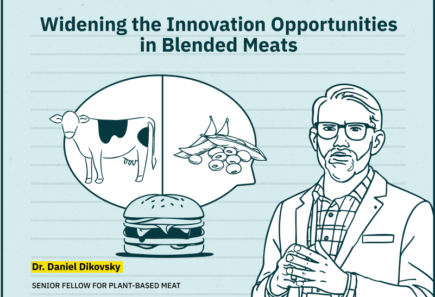Meet the researcher: Dr. Sharon Schlesinger
Meet the researcher: Dr. Sharon Schlesinger
In our latest “Meet the Researcher” series, we introduce Dr. Sharon Schlesinger, a principal investigator at the Faculty of Agriculture at the Hebrew University. With a background in stem cell biology and embryonic development, Dr. Schlesinger has been involved in cultivated meat research for the past four years. Here, she shares her journey and insights into the rapidly evolving field of alternative proteins.

From Stem Cells to Cultivated Meat:
Dr. Schlesinger’s journey into the field of alternative proteins began with her deep-rooted interest in stem cell research and embryonic development. When she founded her lab at the Faculty of Agriculture she started isolating and growing stem cells from livestock, initially without a clear practical application in mind.
This changed when a then student, Dr. Tom Ben-Arye (former senior scientist at GFI Israel), introduced her to the concept of cultivated meat and sought her expertise in growing cow cells. “He explained how fascinating it would be to ask our scientific questions about these stem cells in light of the challenges in cultivated meat,” she recalls.
This sparked her interest in applying stem cell research to cultivated meat, realizing the significant scientific, ethical and practical value it held. Dr. Schlesinger soon recognized that the field was advancing and needed more foundational understanding of livestock stem cells and their differentiation, highlighting the need for greater involvement of stem cell academic labs.
The Evolving Ecosystem in Israel:
Over the past four years, Dr. Schlesinger has witnessed the rapid growth of the cultivated meat field in Israel. What started with her as the sole researcher growing cow stem cells has expanded to include multiple labs across the country. “It has been amazing to see a whole field grow before my eyes,” she says.
She notes that some companies are open for collaborations with academia, which she finds highly beneficial for all. “I think companies that are more engaged with academic research ultimately can greatly benefit from it”. After the initial excitement and rush in the field, she recognizes there is now a better understanding of the scientific challenges involved, making the need for foundational research and for the involvement of academic research more clear.
Inspiration, challenges, and advice for new researchers:
One of the unexpected benefits Dr. Schlesinger has experienced after starting cultivated meat research at her lab is attracting highly motivated, idealistic students. “I see highly idealistic and goal-oriented students, often wonderful ones,” she says. Their enthusiasm and drive are different from those solely focused on academic advancement, bringing a refreshing energy to the research.
With that however, she notes that the scientific disappointments among these students can be higher. “When you come to do research with strong ideals and a desire to change the world, you frequently encounter the difficulties of scientific research that doesn’t always go smoothly, and this can lead to frustration amongst students” she explains.
“Resilience is perhaps the most crucial trait for biologists” says Dr. Schlesinger, noting that the desire to change the world will not be realized during a master’s or Ph.D. program alone. The field of cultivated meat, still in its early stages, offers many open questions and thus the opportunity for students to influence their research direction significantly. Maintaining drive and motivation long term is crucial for success. “Also, asking questions that initially don’t seem directly applicable can eventually end up having a significant impact,” she adds.
Looking Ahead:
Dr. Schlesinger believes that the influx of funding into the field in the last few years has attracted many research groups to join in, which is important for advancing the field forward. She believes that the involvement of strong academic labs can lead to significant breakthroughs, which are needed for the success of the field.
“The Israel Innovation Authority and GFI’s support and fostering are significant in strengthening collaborations between academia and industry,” she notes. “Their early recognition of the field’s potential and the foundation of the national cultivated meat consortium has contributed greatly to creating a strong national base for advancement in it. I feel lucky to get to collaborate with this brilliant group of researchers”.
Looking ahead, she adds, “Information sharing often remains a challenge, and commercialization pressures can sometimes lead to premature implementation of ideas. I would like to see companies move closer to the academic way of working and adopt some of our approaches in research, rather than the other way around,” she says.
Are you interested in getting involved in the science of plant-based food, cultivated meat, and fermentation? Take a look at our resources or check out our science page.
If you’re a researcher:
- Find funding opportunities, check out our research funding database for grants from across the sector, and our research grants page showcases funding available from GFI.
- Explore our Advancing Solutions initiative, which highlights key alternative protein knowledge gaps.
- Use our academic research database and the collaborative researcher directory to find potential collaborators or mentors in the field.
- Find out about research projects that have already been funded on our research grants tracker or our grantee web pages.
- Look out for monthly science seminars run through our GFIdeas community, or use our local and global company database to identify commercial partners.
If you’re a student:
- Find educational courses around the globe through our database.
- Sign up for our free online course introducing the science of alternative proteins, explore our resource guide explaining what is available to students or newcomers to the space.
- Check out our careers board for the latest job opportunities in this emerging field.
Our news, events, and blog
View all of our open-access
publications & databases





